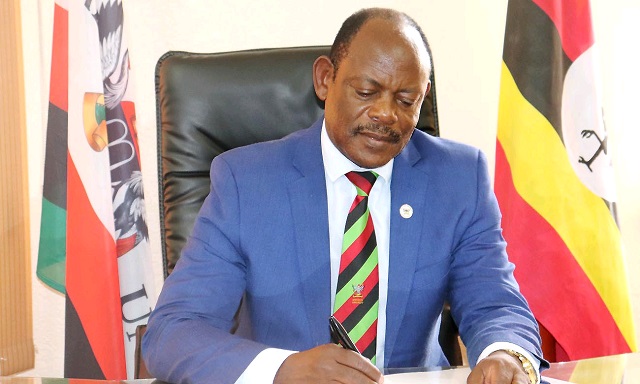
Kampala, Uganda | THE INDEPENDENT | There are mixed reactions among Makerere University students following a decision by the administration to restructure a number of undergraduate courses. The university has already halted the advertisement of 18 undergraduate courses for the next academic year 2021/2022.
The move is in line with the university council decision approved in August 2020 to restructure 20 undergraduate programs, which would see the courses at the university reduce from 82 to 62 in a new curriculum. Universities are required to review their curriculum every three to five years to adapt to the changes in society and the economy.
The affected courses include among others Bachelor of library and information sciences, Bachelor of archives and records management, Bachelor of Science in construction management, Bachelor of Community psychology, Bachelor of Arts in development economics, Bachelor of Science in Telecommunication engineering, Bachelor of computer engineering and Bachelor of environmental science.
In a March 25, 2021, letter to college principals that have been running the affected courses, Makerere University Vice Chancellor, Prof. Barnabas Nawangwe asked them to submit their curricular for the restructured programs to the Senate by May 15th, 2021.
Prof Umar Kakumba, the Deputy Vice-Chancellor Academics Makerere University says courses like Bachelor of Community Psychology and Industrial and Organizational Psychology will be merged under Clinical Psychology. Apparently, the school of psychology has three undergraduate programs.
While some students have welcomed the move to merge the courses, some are worried about what will be left of the school. Community Psychology according to the course outlines produces people that support the wellbeing of people’s mental health in society. They address challenges such as addiction, depression, therapy for victims to torture and influence behaviour change in society.
Industrial and Organizational Psychology on the other hand addresses human resource needs in the corporate community. Davin Nuwagaba, a second-year student of Community Psychology says that this is disappointing to hear since the community may perceive this course as useless once in the job market.
She also adds that the specialization they’ve had gives them in-depth exposure into their specialities unlike after the merger where they might just gross over issues. On the contrary, David Mugisha, a second-year student of Bachelor of Industrial and Organization Psychology has welcomed the move looking at it as a way of consolidation, saying the merger will produce holistic psychologists.
Bachelor of Telecom Engineering will be fused with Electrical Engineering to form Bachelor of Science of Computer and Communications Engineering. However, the courses will stand alone at the Masters Level. Betty Nambalibwa, a third-year student of Bachelor of Telecom Engineering is optimistic about the restructuring. She says this will make the course more practical from the onset.
Brian Ssenoga, a computer engineering student sneers at the idea. He says that it will lead to more confusion in the course than they’ve already had. He said, “We’ve been studying with telecom engineers every first semester of the three years we have been here. There are course units we study and are not related to our course at all. Merging the two will just bring more confusion.”
But Samuel Kimeze, a fourth-year student pursuing the same course feels the courses should have been merged earlier enough when he had just joined. He says this will give them as students a wide scope of knowledge, which makes them fit for the job market.
Prof. Henry Alinaitwe, the Principal of the College of Engineering, Design, Art and Technology notes that the new program will emphasize problem-based learning. He says the curriculum has already been developed but the new program is still subject to approval.
Prof. Kakumba notes that the courses are undergoing restructuring for two reasons, one being to consolidate and strengthen the available programs. “It is not that the courses are useless but we want to make them stronger by restructuring them under the traditional courses,” he said.
He also added that the University wishes to reduce over specialization in undergraduate programs as some courses will be maintained at the Masters level only. As Makerere University prepares to celebrate 100 years in 2022, the quality assurance and gender mainstreaming committee appointed to look into restructuring noted in March 2020 that the process aims at supporting a curriculum that fosters research in the University.
The committee also added that there was a need to reduce duplication and support efficient utilization of human and financial resources.
******
URN
 The Independent Uganda: You get the Truth we Pay the Price
The Independent Uganda: You get the Truth we Pay the Price


